
Question Number 6491 by Temp last updated on 29/Jun/16
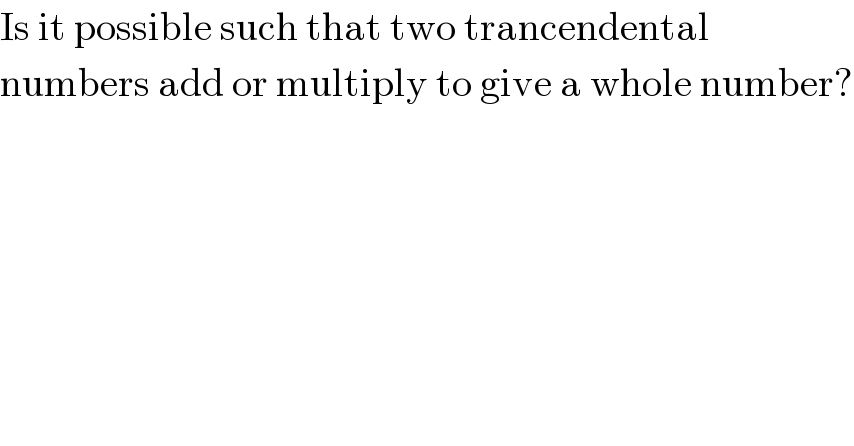
$$\mathrm{Is}\:\mathrm{it}\:\mathrm{possible}\:\mathrm{such}\:\mathrm{that}\:\mathrm{two}\:\mathrm{trancendental} \\ $$$$\mathrm{numbers}\:\mathrm{add}\:\mathrm{or}\:\mathrm{multiply}\:\mathrm{to}\:\mathrm{give}\:\mathrm{a}\:\mathrm{whole}\:\mathrm{number}? \\ $$
Commented by prakash jain last updated on 29/Jun/16
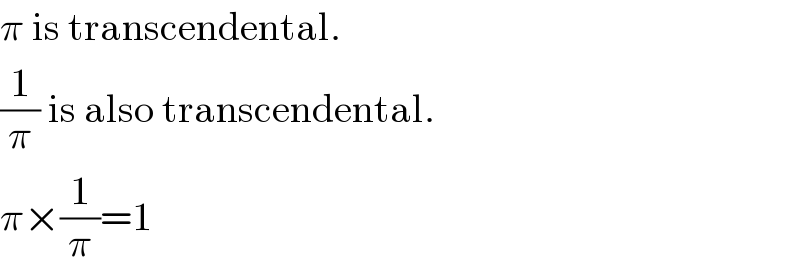
$$\pi\:\mathrm{is}\:\mathrm{transcendental}. \\ $$$$\frac{\mathrm{1}}{\pi}\:\mathrm{is}\:\mathrm{also}\:\mathrm{transcendental}. \\ $$$$\pi×\frac{\mathrm{1}}{\pi}=\mathrm{1} \\ $$
Commented by Temp last updated on 29/Jun/16

$${what}\:{if}\:{in}\:{form}\:{ab},\:{b}\neq{a}^{−\mathrm{1}} ? \\ $$
Commented by Rasheed Soomro last updated on 29/Jun/16

$$\pi×\frac{\mathrm{2}}{\pi}=\mathrm{2},\:{where}\:\frac{\mathrm{2}}{\pi}\neq\pi^{-\mathrm{1}} \\ $$
Commented by Temp last updated on 29/Jun/16
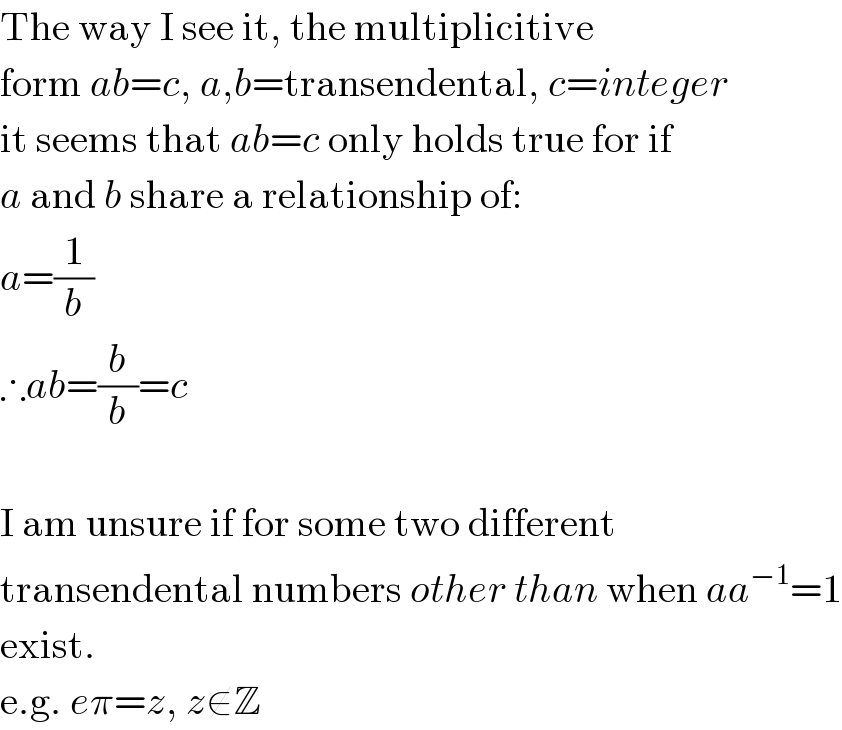
$$\mathrm{The}\:\mathrm{way}\:\mathrm{I}\:\mathrm{see}\:\mathrm{it},\:\mathrm{the}\:\mathrm{multiplicitive} \\ $$$$\mathrm{form}\:{ab}={c},\:{a},{b}=\mathrm{transendental},\:{c}={integer} \\ $$$$\mathrm{it}\:\mathrm{seems}\:\mathrm{that}\:{ab}={c}\:\mathrm{only}\:\mathrm{holds}\:\mathrm{true}\:\mathrm{for}\:\mathrm{if} \\ $$$${a}\:\mathrm{and}\:{b}\:\mathrm{share}\:\mathrm{a}\:\mathrm{relationship}\:\mathrm{of}: \\ $$$${a}=\frac{\mathrm{1}}{{b}} \\ $$$$\therefore{ab}=\frac{{b}}{{b}}={c} \\ $$$$ \\ $$$$\mathrm{I}\:\mathrm{am}\:\mathrm{unsure}\:\mathrm{if}\:\mathrm{for}\:\mathrm{some}\:\mathrm{two}\:\mathrm{different} \\ $$$$\mathrm{transendental}\:\mathrm{numbers}\:{other}\:{than}\:\mathrm{when}\:{aa}^{−\mathrm{1}} =\mathrm{1} \\ $$$$\mathrm{exist}. \\ $$$$\mathrm{e}.\mathrm{g}.\:{e}\pi={z},\:{z}\notin\mathbb{Z} \\ $$
Commented by Temp last updated on 29/Jun/16
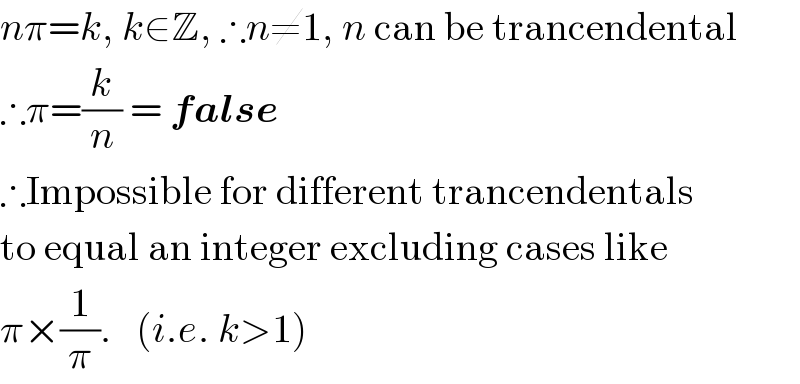
$${n}\pi={k},\:{k}\in\mathbb{Z},\:\therefore{n}\neq\mathrm{1},\:{n}\:\mathrm{can}\:\mathrm{be}\:\mathrm{trancendental} \\ $$$$\therefore\pi=\frac{{k}}{{n}}\:=\:\boldsymbol{{false}} \\ $$$$\therefore\mathrm{Impossible}\:\mathrm{for}\:\mathrm{different}\:\mathrm{trancendentals} \\ $$$$\mathrm{to}\:\mathrm{equal}\:\mathrm{an}\:\mathrm{integer}\:\mathrm{excluding}\:\mathrm{cases}\:\mathrm{like} \\ $$$$\pi×\frac{\mathrm{1}}{\pi}.\:\:\:\left({i}.{e}.\:{k}>\mathrm{1}\right) \\ $$
Commented by Rasheed Soomro last updated on 30/Jun/16
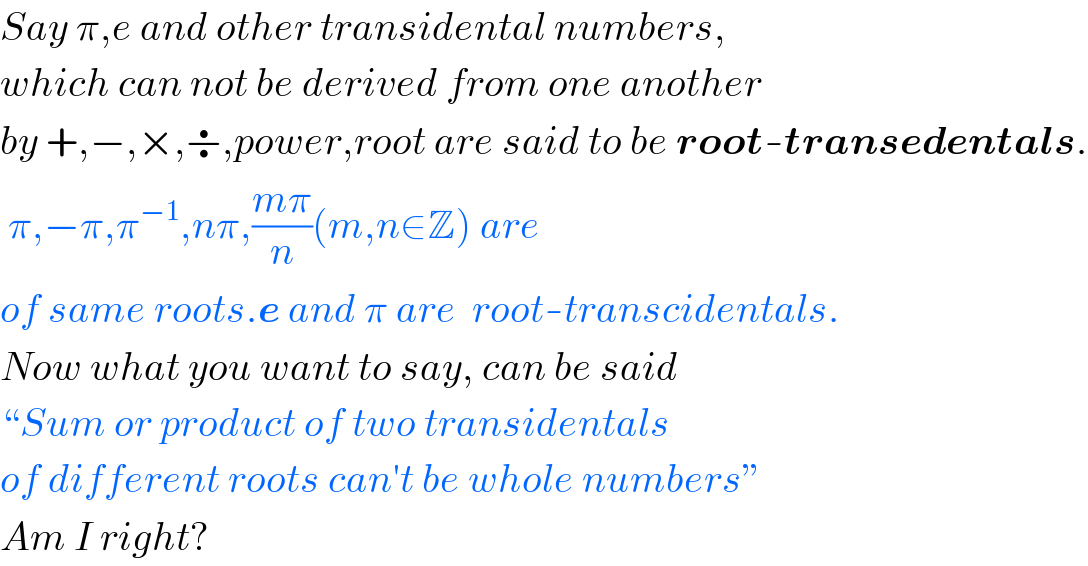
$${Say}\:\pi,{e}\:{and}\:{other}\:{transidental}\:{numbers}, \\ $$$${which}\:{can}\:{not}\:{be}\:{derived}\:{from}\:{one}\:{another} \\ $$$${by}\:+,−,×,\boldsymbol{\div},{power},{root}\:{are}\:{said}\:{to}\:{be}\:\boldsymbol{{root}}-\boldsymbol{{transedentals}}. \\ $$$$\:\pi,−\pi,\pi^{−\mathrm{1}} ,{n}\pi,\frac{{m}\pi}{{n}}\left({m},{n}\in\mathbb{Z}\right)\:{are} \\ $$$${of}\:{same}\:{roots}.\boldsymbol{{e}}\:{and}\:\pi\:{are}\:\:{root}-{transcidentals}. \\ $$$${Now}\:{what}\:{you}\:{want}\:{to}\:{say},\:{can}\:{be}\:{said}\: \\ $$$$``{Sum}\:{or}\:{product}\:{of}\:{two}\:{transidentals} \\ $$$${of}\:{different}\:{roots}\:{can}'{t}\:{be}\:{whole}\:{numbers}'' \\ $$$${Am}\:{I}\:{right}? \\ $$
Commented by prakash jain last updated on 29/Jun/16

$${ab}={n}\Rightarrow{b}=\frac{{n}}{{a}} \\ $$$$\mathrm{So}\:\mathrm{if}\:\mathrm{product}\:\mathrm{of}\:\mathrm{any}\:\mathrm{2}\:\mathrm{numbers}\:\mathrm{is}\:\mathrm{a}\:\mathrm{whole} \\ $$$$\mathrm{number}\:\mathrm{then}\:\mathrm{second}\:\mathrm{number}\:{b}={a}/{n}. \\ $$
Answered by malwaan last updated on 02/Jul/16

$${e}^{\pi\sqrt{\mathrm{163}}} \:{is}\:{an}\:{integer} \\ $$$${e}^{\pi\sqrt{\mathrm{163}}} \:=\:\mathrm{262}\:\mathrm{537}\:\mathrm{412}\:\mathrm{640}\:\mathrm{768}\:\mathrm{744} \\ $$
Commented by malwaan last updated on 03/Jul/16

$${According}\:{to}\:{WolframAlpha} \\ $$$${e}^{\pi\sqrt{\mathrm{163}}} \:=\mathrm{262537412640768743}.\mathrm{99999999999925007}.... \\ $$$${what}\:{do}\:{you}\:{think}? \\ $$$${very}\:{small}\:{error}\:{because}\:{of}\:{calculation}\:{rounding} \\ $$
Commented by prakash jain last updated on 02/Jul/16

$$\mathrm{According}\:\mathrm{to}\:\mathrm{Wolfram}\:\mathrm{alpha}\:{e}^{\pi\sqrt{\mathrm{163}}} \:\mathrm{is}\: \\ $$$$\mathrm{a}\:\mathrm{transcendental}\:\mathrm{number}. \\ $$$$\mathrm{2}.\mathrm{6253}..×\mathrm{10}^{\mathrm{17}} \\ $$
Commented by Rasheed Soomro last updated on 03/Jul/16

$${According}\:{to}\:{wikiepedia} \\ $$$${e}^{\pi\sqrt{{n}}} \:\:{is}\:{transcedental}\:{for}\:{any}\:{positive}\:{n} \\ $$
Commented by malwaan last updated on 03/Jul/16

$${e}^{\pi\sqrt{\mathrm{163}}} \:{had}\:{been}\:{conjectured}\:{around} \\ $$$$\mathrm{1914}\:{by}\:{the}\:{indian}\:{mathematician} \\ $$$${Srinivasa}\:{Ramanujan}\:. \\ $$$${In}\:{May}\:\mathrm{1974}\:{John}\:{Brillo}\:{of}\:{the} \\ $$$${university}\:{of}\:{Arizona}\:{managed}\:{to} \\ $$$${prove}\:{that} \\ $$$${e}^{\pi\sqrt{\mathrm{163}}} \:=\mathrm{262}\:\mathrm{537}\:\mathrm{412}\:\mathrm{640}\:\mathrm{768}\:\mathrm{744} \\ $$$$ \\ $$
Commented by Rasheed Soomro last updated on 03/Jul/16

$${New}\:{knowledqe}\:{for}\:{me}. \\ $$
Commented by prakash jain last updated on 03/Jul/16

$$\mathrm{W}.\:\mathrm{alpha}\:\mathrm{clearly}\:\mathrm{states}\:\mathrm{that}\:\mathrm{it}\:\mathrm{is}\:\mathrm{a}\:\mathrm{trancendental} \\ $$$$\mathrm{number}. \\ $$$$\mathrm{It}\:\mathrm{is}\:\mathrm{almost}\:\mathrm{an}\:\mathrm{integer}. \\ $$
Commented by malwaan last updated on 04/Jul/16
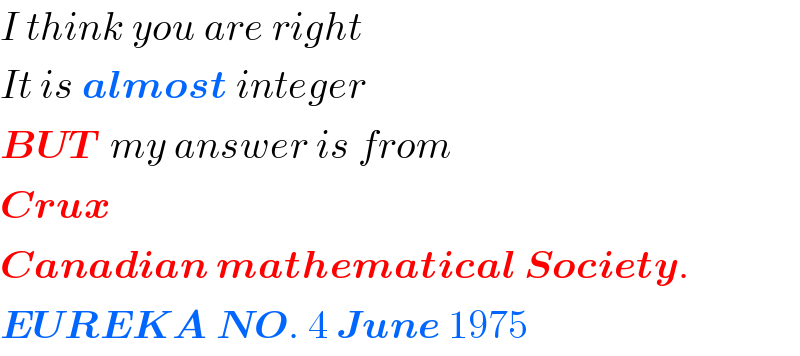
$${I}\:{think}\:{you}\:{are}\:{right} \\ $$$${It}\:{is}\:\boldsymbol{{almost}}\:{integer} \\ $$$$\boldsymbol{{BUT}}\:\:{my}\:{answer}\:{is}\:{from} \\ $$$$\boldsymbol{{Crux}} \\ $$$$\boldsymbol{{Canadian}}\:\boldsymbol{{mathematical}}\:\boldsymbol{{Society}}. \\ $$$$\boldsymbol{{EUREKA}}\:\boldsymbol{{NO}}.\:\mathrm{4}\:\boldsymbol{{June}}\:\mathrm{1975} \\ $$
Answered by Temp last updated on 01/Jul/16
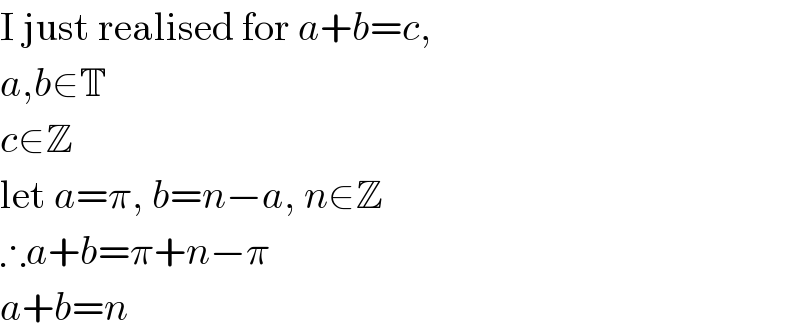
$$\mathrm{I}\:\mathrm{just}\:\mathrm{realised}\:\mathrm{for}\:{a}+{b}={c}, \\ $$$${a},{b}\in\mathbb{T} \\ $$$${c}\in\mathbb{Z} \\ $$$$\mathrm{let}\:{a}=\pi,\:{b}={n}−{a},\:{n}\in\mathbb{Z} \\ $$$$\therefore{a}+{b}=\pi+{n}−\pi \\ $$$${a}+{b}={n} \\ $$
Commented by Rasheed Soomro last updated on 01/Jul/16

$$\pi\:{and}\:\:{n}−\pi\:{are}\:{derivations}\:{of}\:{same} \\ $$$${transcedental}\:\left(\pi\right). \\ $$$${Is}\:{there}\:{an}\:{example} \\ $$$${of}\:{two}\:{transcedentals}\:{which}\:{are}\:{not} \\ $$$${derivations}\:{of}\:{same}\:{transcedental} \\ $$$${and}\:{give}\:{the}\:{sum}\:{or}\:{product}\:{as}\:{whole} \\ $$$${number}? \\ $$
Commented by Temp last updated on 01/Jul/16

$$\mathrm{That}\:\mathrm{is}\:\mathrm{an}\:\mathrm{interesting}\:\mathrm{point}\:\mathrm{which} \\ $$$$\mathrm{I}\:\mathrm{am}\:\mathrm{very}\:\mathrm{interested}\:\mathrm{to}\:\mathrm{find} \\ $$
Commented by Rasheed Soomro last updated on 01/Jul/16

$${An}\:{other}\:{question}\:{is}: \\ $$$${Are}\:\:{there}\:{two}\:{transcedentals},\:\left({which}\:{are}\right. \\ $$$$\left.{not}\:{derived}\:{from}\:{same}\:{transcedental}/{s}\right)\:{whose} \\ $$$${sum}/{product}\:{is}\:{an}\:\boldsymbol{{algebraic}}\:\boldsymbol{{number}}? \\ $$
Commented by prakash jain last updated on 01/Jul/16

$$\mathrm{If}\:\mathrm{sum}/\mathrm{product}\:\mathrm{is}\:\mathrm{algebraic}\:\mathrm{the}\:\mathrm{second} \\ $$$$\mathrm{transcendental}\:\mathrm{number}\:\mathrm{can}\:\mathrm{be}\:\mathrm{derived}\:\mathrm{from} \\ $$$$\mathrm{the}\:\mathrm{first}\:\mathrm{algebraic}\:\mathrm{number}\:\mathrm{by}\:\mathrm{adding}\:\mathrm{or}\:\mathrm{subtracting} \\ $$$$\mathrm{the}\:\mathrm{first}\:\mathrm{transcental}\:\mathrm{number}. \\ $$$$\mathrm{The}\:\mathrm{problem}\:\mathrm{statement}\:\mathrm{implies}\:\mathrm{that}\:\mathrm{that} \\ $$$$\mathrm{second}\:\mathrm{transcental}\:\mathrm{and}\:\mathrm{first}\:\mathrm{transcendental} \\ $$$$\mathrm{numbers}\:\mathrm{can}\:\mathrm{be}\:\mathrm{derived}\:\mathrm{using}\:\mathrm{the}\:\mathrm{sum}. \\ $$$$\mathrm{so}\:\mathrm{the}\:\mathrm{two}\:\mathrm{conditions}\:\mathrm{are}\:\mathrm{contrdictory} \\ $$$${t}_{\mathrm{1}} +{t}_{\mathrm{2}} ={n}\:{for}\:{some}\:{n}\in\mathbb{Z}\:\:\left(\mathrm{1}\right) \\ $$$$\mathrm{also}\:\mathrm{second}\:\mathrm{condition}\:\mathrm{is} \\ $$$${t}_{\mathrm{1}} \neq{n}−{t}_{\mathrm{1}} \:\forall{n}\in\mathbb{Z}\:\:\left(\mathrm{2}\right) \\ $$$$\left(\mathrm{2}\right)\:\mathrm{contradicts}\:\mathrm{with}\:\left(\mathrm{1}\right) \\ $$$$\mathrm{same}\:\mathrm{applies}\:\mathrm{for}\:\mathrm{multiplication}. \\ $$
Commented by Rasheed Soomro last updated on 03/Jul/16

$${Your}\:{comment}\:{is}\:{decisive}! \\ $$
